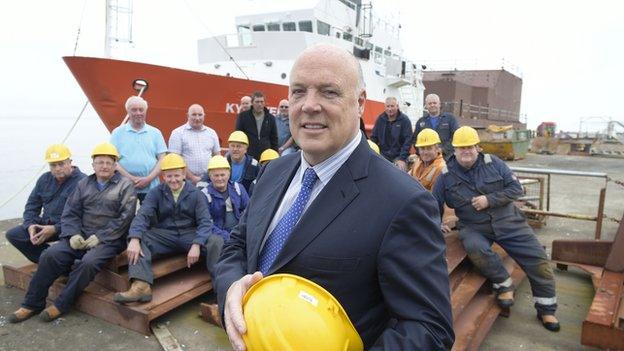Businessman Jim McColl backs fiscal autonomy
- Published
One of Scotland's most successful businessmen, Jim McColl, calls for Holyrood to have full control over its finances by 2020.
One of Scotland's most successful businessmen, Jim McColl, has called for Holyrood to have full control over its finances by 2020.
He said this would give Scotland "meaningful powers" to grow the economy and close the public spending gap the new system would create.
Mr McColl, who runs Clyde Blowers Capital, backed a "yes" vote in the independence referendum.
But he says that issue has now been "settled".
He has reverted to supporting full fiscal autonomy for Scotland.
Home rule
That would mean Holyrood taking charge of all Scotland's revenues and paying Westminster for shared services such as defence and foreign affairs.
However, Scottish Lib Dem leader Willie Rennie said fiscal autonomy would be unsustainable and insisted it was not a variation on his party's preference for home rule.
Speaking on BBC Scotland's Good Morning Scotland programme, he said: "It's an unstable form of devolution that would tip over into independence very, very quickly.
"It would involve an £800 tax bill for every single person in Scotland. I think that is unsustainable. If that's what the SNP stand for, go ahead and argue for it."
In a BBC interview, Mr McColl said there did not have to be another independence referendum.
Entrepreneurial culture
"If you want to avoid something like that happening again, you really have to be a bit more open about what you're going to devolve," he said.
"There's an opportunity to do that just now and I think if you don't do it, then it's just going to be one of those things that hangs over us for a long time".
The businessman, who is also a member of the Scottish government's council of economic advisers, wants Holyrood to have much greater financial powers.
He thinks corporation tax and capital gains tax are essential, if Scotland is to promote a more entrepreneurial culture.
But, like the Scottish government, he would prefer full fiscal autonomy.
Critics argue that falling oil prices mean that would leave a multibillion-pound hole in Scotland's finances.
'Smooth the downturns'
In his BBC interview, Mr McColl predicted oil prices would recover but conceded there would be financial challenges if the shift to fiscal autonomy happened suddenly.
"There would be a gap if you were allocating all these revenues. Yes, there would be," he said.
"There has to be a change over a period, though. And that's where you also have borrowing capacity.
"If you have the capacity to raise your own bonds - like a tartan bond or a Caledonian bond - that's to smooth over the downturns, when you raise government finance.
"And then when it's running well that's when you fix the roof and you tuck the money away - you don't waste it."
Mr McColl suggested that full fiscal autonomy could be phased in over the term of the next UK parliament, which ends in 2020.
He added: "It takes time to do the transition and you would have to have some sort of transition between the Barnett formula dropping off and the new way of working coming in."
'Disaster for Scotland'
The Barnett formula currently determines how much money the Scottish government receives to fund public services such as health and education.
A Scottish government spokesman said: "Scotland already more than pays its own way, with more revenue raised per head than the rest of the UK for every one of the last 34 years.
"Fiscal autonomy, with full economic and job-creating powers, would give Scotland the capacity and the resources to grow the economy even further, address inequalities and invest according to our own priorities."
A spokesman for the Scottish Labour Party said: "The SNP's plan for full fiscal autonomy would be a disaster for Scotland and mean extra cuts of £7.6bn - even more than those planned by George Osborne.
"Scotland can't afford full fiscal autonomy which would scrap Barnett and the block grant and replace it with plummeting oil revenues."
The Scottish Conservatives have tabled a debate on full fiscal autonomy in the Scottish Parliament today.
Conservative finance spokesman Gavin Brown said: "All the figures by independent experts show there will be a lot of pain over the next five years if we adopted full fiscal autonomy. We now have one of the Scottish government's own economic advisers effectively making the same point."
A motion proposed by Mr Brown at the Scottish parliament was backed by MSPs, but only after being substantially amended by Finance Secretary John Swinney.
Mr Swinney's wording recognised that Scotland requires the social and economic powers necessary to reflect the needs and preferences of the people of Scotland.
The original motion noted that a number of fiscal experts predict a weaker fiscal position for Scotland should full fiscal autonomy be achieved.
- Published23 September 2014

- Published11 September 2014

- Published7 September 2012
